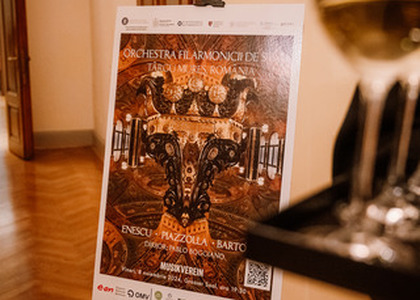> [Archived] Interviews

Interview with Ovidiu Maior, president of the Iunona Community Development Association in Târgu Mureș
The Târgu Mureș Philharmonic Orchestra conducted by Pablo Boggiano gave an extraordinary concert on Friday, November 8th, in the Golden Hall of the famous Musikverein complex in Vienna, in a bid to promote the values of Târgu Mureș and Romania abroad.
Ovidiu Maior, president of the Iunona Community Development Association, organizer of the event, gave us details about this project in an interview with Lucian Haralambie, live on "Musica viva".
Ovidiu Maior, president of the Iunona Community Development Association in Târgu Mureș, live by phone in the Musica viva morning show.
Good morning!
Good morning! Thank you very much for the invitation.
Good to hear from you. The Association that you founded together with MihailPoruțiu aims to promote at local, national and international level the specific values of Târgu Mureș and Romania. To this end, you supported the organization of the concert on Friday, November 8th, performed by the Târgu Mureș Philharmonic Orchestra. The members of the ensemble, conducted by Pablo Boggiano, performed in the famous Golden Hall of the Musikverein in Vienna. How did the idea of performing there come about?
There's quite a history behind it. In 2017, in Târgu Mureș, organized the first edition of a Viennese-style ball. The Palace of Culture in Târgu Mureș, a beautiful hall, was well suited for such an event. And, two years later, in 2019, we started collaborating with Pablo Boggiano - an Argentine conductor already established in Vienna for more than 20 years, who came to Târgu Mureș to conduct the orchestra in this ball and brought with him the Viennese spirit and, obviously, the musical experience from there.
Two years ago, after an edition of the ball, I had a discussion with Pablo and I came to the conclusion that it would be very nice to reverse this path. Not to have Vienna come to Targu Mures, but to have Targu Mures go to Vienna. And this is how our project was born. It was a bit of work, but the Friday evening in the Musikverein was special.
How was the atmosphere on Friday? How were the musicians of the Târgu Mureș Philharmonic received, Ovidiu Maior?
It was a very pleasant surprise. Admittedly, we are a small town in Transylvania, somewhere in the shadow of Cluj, but from a cultural point of view it was a great surprise to have the orchestra at the Musikverein. Quite an interesting program, conceived by Pablo Boggiano and the artistic secretaries of the Târgu Mureș Philharmonic, which very pleasantly surprised the Austrian audience. Obviously, there were many people from Mures, many Romanians living in Austria, but there were also Austrians, who usually come to such concerts and.... I think that three encores at the end means a lot for a Romanian orchestra in Austria.
How will the project to promote the values of Târgu Mureș continue?
We are already preparing the next concert, which will take place next November in another European capital. We will unveil the name of the capital on November 22nd, at this year's edition of the Târgu Mureș Palace Ball. And I think, in all likelihood, we will include another
European capital in that week in November.
We have set ourselves the goal that at least once a year we will be able to go out with the Târgu Mureș Philharmonic Orchestra in a large-scale concert, which, as you have rightly mentioned from the start, will promote our community first of all, then Transylvania and then Romania on the world's major stages.
Culture has become a very good ambassador and the collaboration we had with the state institutions in Austria - this time, the Embassy, the Romanian Cultural Institute in Vienna - gave us the opportunity to organize this event in all its details and with a very great impact for Romania at international level.
I wish you success for next year's project. We'll be in touch on Radio România Muzical on this subject. Ovidiu Maior, president of the Iunona Community Development Association in Târgu Mureș, thank you for being here!
Thank you very much and thank you Radio România for the extraordinary partnership we had on this project.
Photo: Bereczki Sandor
Translated by Bianca-Daniela Penaru,
University of Bucharest, Faculty of Foreign Languages and Literatures, MTTLC, year II
Corrected by Silvia Petrescu














